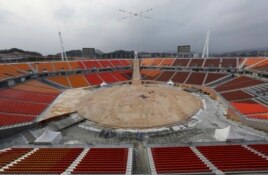17 December, 2017
Officials in South Korea are concerned about what will happen to Pyeongchang Winter Olympic structures and stadiums after the games next year.
The Winter Olympics begin on February 9, 2018. Officials are busy preparing for events in and around the small mountain town of Pyeongchang. But concerns remain about the huge cost of hosting the Games in one of South Korea's poorest areas.
Local officials hope the Olympics will help economic development by making the area as an international destination for travelers. But, past Olympics have shown that hosts who hoped for economic gains after the games are often disappointed.
Pyeongchang is in Gangwon province. So is nearby Gangneung, a seaside city that will host Olympic skating and hockey events. Officials there are urging the national government to provide money to maintain the new arenas that may have little use after the Olympics.

The Pyeongchang Olympic Stadium is under construction in Pyeongchang, South Korea, Saturday, Nov. 25, 2017.
So far, the South Korean government has not agreed to such a plan.
The Olympics are expected to cost South Korea about $12.9 billion. That amount is more than the $7 to 8 billion that was estimated when Pyeongchang was announced as host in 2011.
People who live in Gangwon province say the government has long ignored the area's needs. They also worry about the event's high cost.
"What good will a nicely managed global event really do for residents when we are struggling so much to make ends meet?" said Lee Do-sung, a Gangneung restaurant owner. "What will the games even leave? Maybe only debt."
Some structures may be torn down
The mood was very different 30 years ago when the country was preparing to host the 1988 Seoul Summer Olympic Games. That event helped shape the capital city into what it is today.
A sports complex and huge public parks were built along the Han River. Next came new highways, bridges and public transportation. High-rise buildings were built where old, poor neighborhoods once stood.
The effects of the country's second Olympic Games will be less clear.
For example, Pyeongchang's Olympic Stadium seats 35,000 people although just 40,000 people live in the town. The stadium will only be used for the opening and closing ceremonies of the Olympics and Paralympics. Then, workers are expected to tear it down.
A downhill ski course in nearby Jeongseon will also be restored to its natural state and no longer used for skiing. The course was built in a huge forest considered sacred by local people.
Gangwon officials want the national government to help pay for restoring the forest. Such efforts could cost as much as $95 million.

In this Monday, Oct. 30, 2017, photo, the Alpensia Ski Jumping Centre is being prepared in Pyeongchang, South Korea.
"A National event, not a Gangwon event"
Both the 1988 Seoul Olympics and the 2002 FIFA World Cup were events paid for by the national government. The provincial government, however, led the effort to host the 2018 Winter Olympics.
Under current plans, Gangwon will manage at least six Olympic sites after the games. The costs to do so will be high. These sites will create an $8.5 million budget deficit for the area every year.
Hong Jin-won is a Gangneung resident and activist. He has been following Olympic preparations for several years. He said the real cost could be even bigger. And he said aid to help the area's poor could get cut to help make up for the lack of money.
South Korea is a rapidly aging country with a widening rich-poor gap. The Organization for Economic Cooperation and Development (OECD) says South Korea has the highest poverty rate among the aged of all OECD countries.
The sites may need to be torn down if the national government does not pay to maintain them, or if Gangwon does not make them cultural or popular attractions.
Park Cheol-sin is an official in Gangwon. He said the national government must step up because, in his words, the "Olympics are a national event, not a Gangwon event."
I'm Dorothy Gundy.
Ashley Thompson adapted this story for VOA Learning English from an AP report. Mario Ritter was the editor.
We want to hear from you. Write to us in the Comments section, and visit 51VOA.COM.
________________________________________________________________
Words in This Story
host –v. to hold an event
arena –n. a building for sports and other forms of entertainment
destination –n. a place that people go to or are sent to
residents –n. people who live in a place
mood –n. the way someone feels, an emotional state
sacred –adj. holy, the quality of being worshiped
sites –n. specific places or structures